Welcome to Smugglivus 2013! Throughout this month, we will have daily guests – authors and bloggers alike – looking back at their favorite reads of 2013, and looking forward to events and upcoming books in 2014.
Who: Elizabeth Wein, author of the incomparable Code Name Verity and its 2013 companion novel, Rose Under Fire. Suffice it to say, both of us Smugglers are huge fans.

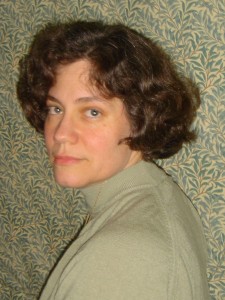
Please give a warm welcome to Elizabeth, everyone!
Sympathetic Magic—Elizabeth Wein
Excuse me while I put my folklorist’s hat on (this is me in my folklorist’s hat):
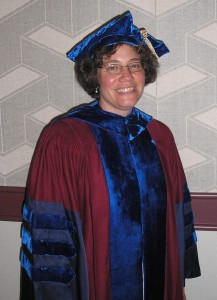
I hereby invoke seasonal liminality and the supernatural tradition of the closing of the year to talk about the numinous reality of Story. (Okay, I will take off my folklorist’s hat so I can stop talking like an academic.)
Instead, to get me in the mood, I’m going to unwrap a ritual Hershey Bar. And smell the wrapper. Because we’ve travelled from the same place, this Hershey bar and me— from central Pennsylvania by separate routes—and yet we’ve come together here by the fire in my living room in Scotland. I smell the wrapper and I’m transported to another time and place—driving to work with the faint smell of chocolate wafting through the open windows over the rolling green fields. The foil wrapper smelling of chocolate magically evokes another world.
The term “sympathetic magic” is a 19th century scholarly attempt to theorize about magic and its meaning in society. The idea is that magic works by objects exerting action “on each other at a distance through a secret sympathy” (Sir James Gordon Frazer, in The Golden Bough, 1922); the weaver of the spells believes there is some kind of sympathetic connection between magic and the object it works on. There are generally two subdivisions of sympathetic magic—homeopathic magic, in which the sympathy comes from things sharing an identity (think of envoûtement, in which one might attempt to harm a person by damaging an effigy or picture of that person)—or contagious magic, in which the contact a person has had with an object imbues it with that person’s essence (a lock of hair or the owner’s handkerchief might substitute for an image).
Now that I’ve burdened you with a lot of academic slight of hand, I want you to think about Mockingjay pins (my daughter owns two). Of grown men and women inspired by The Great Gatsby to dress up in 1920s eveningwear to go to the movies. Of a programme run last year by the Botanic Garden in Oxford in which “students visit several of the locations that inspired the [His Dark Materials] trilogy written by Philip Pullman” including the Botanic Garden, the Pitt Rivers Museum and Exeter College.
I have a theory that our need to see and touch and wear the things that our fictional heroes and heroines wear and see and touch, and to visit the actual places where they fictionally set foot, is a form of sympathetic magic. It doesn’t just bring us closer to our favourite books: it brings us closer to being part of their world. Jen talks about this effect without defining it on the blog Reads For Keeps in reference to my own novel, Code Name Verity, in which she lists a number of random things that have taken on special significance for the reader because of their relevance to the novel—ranging from egg cups to combat boots to North Sea seals! If an object exists, and you can see it or touch it, the story might really be true (The Code Name Verity Effect).
The comments to this post recognize the effect for what it is, separate from its connection to Code Name Verity, though still without defining it. One commenter says she learned to knit because of reading Dicey’s Song by Cynthia Voigt; another talks about being moved almost to tears at the site of the Battle of Hastings because of its connection to The King’s Shadow by Elizabeth Alder. I think maybe the best example from my own life is how, in 1986, I sought out and found the mechanical street map described in Manchester’s Piccadilly in the first chapter of Alan Garner’s Elidor.
Here’s what I wrote in my journal at the time:
There are two panels; one contains, under plastic, half a scrunched up street map, and numbered references to key places (stations, town hall, important roads, etc.). The other panel is empty except for bunches of tangled, torn, meaningless wire. The shell of Roland’s map. But unquestionably the right one. And the funny thing is, I think I feel better about finding it like that than I would feel if it were working and intact, but without [the street from Elidor]… the fact that it’s a useless wreck connects it to the ruined churches and towers of Elidor far more distinctly, secretly and eerily, than a replacement or an updated version possibly could. That’s what Elidor is about—waste places, boundaries, out of date wreckage that connects and links directly to something else… Somehow a part of both worlds.
The map when I found it was decades out of date and derelict. But it was there. It was real. And that made it feel like Elidor, too, could be real.
Sympathetic magic.
When Code Name Verity was first published, reviewers were very reluctant to give away anything about its extremely complex plot. They still are, something that surprises and delights me. But I noticed something else people rarely give out—Verity’s real name. There’s no reason not to, because her name isn’t a spoiler. It’s true that she doesn’t reveal her real name until about halfway through the book, and it’s true that she reveals it under moving circumstances, but it’s not a plot secret. And yet no one calls her by her name in public. They do in comments. They do in fanfic. They do in letters to me. Why not in public?
This, more than anything, touches my heart when I see it in action—touches my heart and makes it ache. I think it is sympathetic magic. You might call a secret agent by her real name in private, as a friend would; but by consciously refusing to reveal her name in public, you become her conspirator. You are protecting her. You’re not just showing your appreciation for a book—you’re participating in the story. And that makes it feel real.
I had one reader tell me that when she finished reading Code Name Verity she felt she had to leave the bedroom windows open the way Verity’s mother does—the way Mrs. Darling does in Peter Pan—even though there was a snowstorm going on! “Because,” as she wrote to me, “when the window is open, there is always hope.”
The Hershey bar? That’s a reference to Rose Under Fire, in which Rose evokes the smell of home by burying her nose in the foil wrapper of a chocolate bar. But now, for me, the Hershey bar evokes Rose. I drew on a lot of my own Pennsylvania background in constructing Rose, and as a result I unwittingly contaminated a whole swathe of my life with sympathetic magic. I can’t look at my grandmother’s Christmas tablecloth or listen to rain on the porch roof or eat any number of Pennsylvania Dutch foods or hear a Girl Scout song or see a red bikini or read any poem by Edna St. Vincent Millay any more without feeling a kind of virtual jolt to the heart—because of the significance I have invested these things with in my fictional world.
The power to make real worlds out of imaginary worlds is possibly the most wonderful thing about being an author. I longed for magic when I was a child—books brought tantalizing, fleeting glimpses of glitter and glamour that I couldn’t quite touch. But then I spent a summer afternoon working in the rose garden at the Manor House at Hemingford Grey, the “Green Knowe” of the books by Lucy Boston. I found the ceremonial shield in the Pitt Rivers Museum that inspired The House in Norham Gardens by Penelope Lively. It’s why I included the link to the instructions for Maddie’s mittens at the end of Code Name Verity—a way to give readers a physical connection to the imaginary narrator.
As a young reader, through the books I loved I could become enchanted, and the magic seemed real. Now, as a writer in my own right, it is real. I can make the worlds I wanted so much to be part of. I wished I could be Aladdin, with a magician at my command; instead I have become the magician. I didn’t know this was going to happen until it happened: until the Hershey bars became contaminated with significance.
Sympathetic magic is one of the most amazing, wonderful and mysterious things about being a reader.
—————————-
(Oh, and here’s that link to Maddie’s mittens. Scroll through the pictures till you get to “Mittens for Women.” The second link points you directly to the instructions. Happy holidays!)
http://www.vam.ac.uk/users/node/1744
http://media.vam.ac.uk/media/documents/legacy_documents/file_upload/13004_file.pdf
Thank you, Elizabeth!


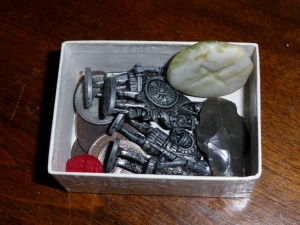
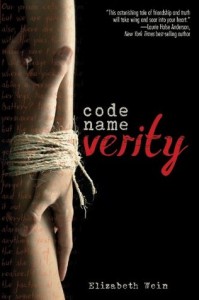
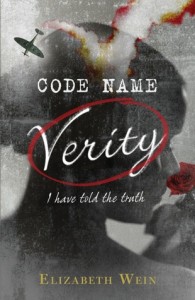










4 Comments
Maureen E
December 14, 2013 at 12:04 pmOh, what an interesting idea! One of the strongest for me was at Ely, which is so imbued with The Dean’s Watch by Elizabeth Goudge, besides being a slightly magical place anyway.
Actually, no–I take that back. It was seeing the tombstone of one of the few members of the Ninth Legion to return. As a Rosemary Sutcliff fan, it sent shivers up my spine. It took that piece of long-ago history+fiction and made it corporeal.
And as I mentioned on Twitter, knowing all of Rose’s songs (and Nick’s round) made the RUF audiobook almost painfully real. (Plus now I might be a little weepy over the Hershey bar.)
ewein2412
December 16, 2013 at 9:12 amI also got to see the memorial stone that Abreha erected to commemorate the rebuilding of the dam at Marib, which is mentioned in The Empty Kingdom – the stone was part of an exhibit on ancient Yemen at the Smithsonian. It was the most amazing thing for me, seeing a *real* artifact “made” by someone I’d turned into a fictional character.
Jen has riffed further on this topic over on Reads for Keeps, pointing out that for her, “sympathetic magic” actually has a different result – not that it makes her feel “part of” the story, but that an object’s connection with a story adds an aura of specialness to that object that wasn’t there before:
http://readsforkeeps.wordpress.com/2013/12/15/the-sympathetic-magic-of-reading/
J. Kathleen Cheney
December 16, 2013 at 9:53 amI hadn’t thought about this being a form of sympathetic magic before….now I’m going to spend all my morning thinking about it. ;o)
Mia
December 16, 2013 at 10:16 amWhat a beautiful idea. I went to the UK for vacation earlier this year and spent a day in Bathe (a completely enchanting place. I loved it there) and spent the day in a Jane Austen filled fervor. I never gave it much thought why it felt so important to spend time there.
Also, I find it ridiculous that I read Code Name Verity in February and I still tear up at the mere mention of it. I loved it that much.